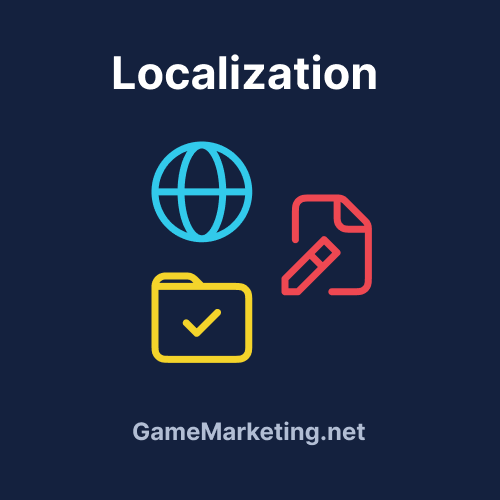Game Localization & Translation

Available Options
Game localization is a crucial aspect of marketing that many developers overlook, yet it plays a pivotal role in expanding the reach of your game. While we’re not a traditional game localization agency, we understand the importance of getting your game into different languages to maximize its potential in international markets. That’s where we come in. We help you navigate the localization process by connecting you with the best translation agencies suited for your game, whether you're targeting Japanese, German, Brazilian Portuguese, or another language.
Why Localize Your Game?
You might wonder, “Why do I need to translate my game? Isn't English enough?” While it's true that English is widely spoken, there are entire regions where English proficiency is low, yet the demand for video games is incredibly high. For instance, Japan, Germany, and Brazil have massive gaming markets, and players in these countries tend to prefer content in their native language. In fact, Japanese and German gamers, in particular, are known to gravitate toward titles fully localized into their language, and many will skip over games that aren’t.
Game localization is about more than just translating text. It’s about adapting your game’s content to different cultures, making it feel native to each audience. This means localizing your game can lead to higher engagement, better reviews, and increased sales in markets you might not have tapped into otherwise.
Choosing the Right Languages for Localization
Not every game needs to be localized into every language. The kind of game you're developing can heavily influence which languages you should prioritize. For example, if you're working on a strategy game or a narrative-heavy RPG, localizing it into German should be high on your list. The German market has a strong affinity for these genres, and missing out on localization could mean losing a significant portion of potential players.
On the other hand, if your game is action-oriented with minimal dialogue or text, you might want to consider starting with languages like Japanese, where action games thrive. Targeting the Chinese market can also be essential for certain genres, given the sheer number of gamers in China and their growing presence on platforms like Steam. Translating your game into Simplified Chinese could dramatically increase your visibility in this lucrative market.
The Cost of Game Localization
It's essential to understand that localizing a game isn’t cheap, especially if your game contains a lot of text. Each language can cost several thousand dollars to translate, and this is where the strategy aspect of localization comes into play. Rather than translating your game into every language right away, it’s smarter to identify key markets where your game is likely to succeed and focus your resources there first.
For example, if you’re on a tight budget, you might choose to localize only into one or two languages initially, depending on where you see the highest demand. Once your game gains traction in those markets, you can reinvest the profits into localizing for other languages. This strategic approach ensures that you’re getting the best return on investment without overextending your budget.
How Game Localization Works
If you're new to the localization process, it might seem overwhelming, but we’re here to simplify it for you. The first step is preparing your game's text in a structured format—usually JSON or a similar file type. This organization is crucial because it speeds up the localization process and minimizes errors. If your game’s text is well-organized, translation agencies can easily extract the content, translate it, and then return it to you in the same format. This makes it much easier to integrate the translated text back into your game.
The agencies we work with are experts in game localization. They not only translate the text but also adapt it to fit cultural nuances, ensuring that nothing is lost in translation. If you're developing a game with in-depth dialogues or intricate gameplay mechanics, working with experienced localization professionals is essential to avoid mistranslations that could confuse or alienate players.
Don’t Forget to Localize Your Store Page
Localization doesn’t stop at your game’s content. You should also translate your game’s store page. Platforms like Steam rank games higher in their local markets if the store page is localized into the relevant language. For example, if you have a Japanese store page for your game, it’s much more likely to rank higher on the Japanese Steam platform than a game that only has an English page. The same applies to the Chinese market, where localized store pages are critical for visibility.
Translating your game’s store page is often more affordable than translating the entire game, but it can have a massive impact on your game’s discoverability. A localized store page can increase your chances of landing on the front page of regional storefronts, boosting sales and gaining more players.
The Importance of the Chinese Market
China is a unique and rapidly growing market for video games. The number of gamers in China is staggering, and they’re avid consumers of many genres, particularly strategy, RPG, and mobile games. However, localizing your game into Chinese isn’t just about translation—it’s about unlocking access to a market that Western developers often find difficult to penetrate. Steam serves as a gateway to China for many Western games, and having your game localized in Chinese can be the difference between obscurity and success in this market.
Finding the Right Localization Partner
We’ve already partnered with some of the best localization agencies for languages like Japanese, German, and Brazilian Portuguese. If you require translation services for other languages, we can help you find the right agency for the job. We understand that each game is unique, and finding the perfect localization partner who understands your game's genre, tone, and target market is key.
By working with us, you can focus on developing your game, while we take care of the heavy lifting of finding the right agency, managing the translation process, and ensuring that your game reaches the right audiences across the globe.
In conclusion, game localization is a vital step in growing your game's audience and reaching new markets. It’s an investment that can lead to higher sales, better reviews, and a more engaged player base. Let us help you navigate this complex but rewarding process, and take your game to the next level.



